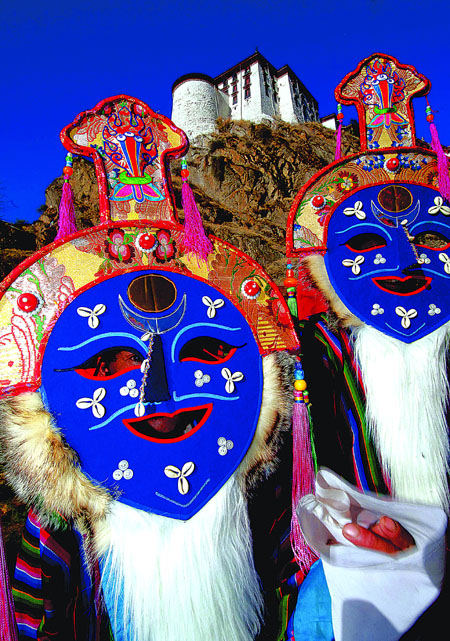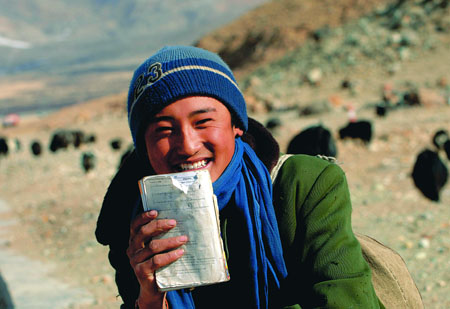| Over the past 40 years, Tibet has made full use of the rights granted by the PRC Constitution to develop its cultural undertakings. This makes it possible to inherit and further develop its traditional culture.
Study and Use of Tibetan Language
The Tibet Autonomous Region enacted and implemented the Stipulations of the Tibet Autonomous Region for the Study, Use and Development of the Tibetan Language (For Trial Implementation) and the Rules for the Implementation of the Stipulations of the Tibet Autonomous Region for the Study, Use and Development of the Tibetan Language (For Trial Implementation) in 1987 and 1988 respectively. Both contain clear stipulations for equal importance on the use of Tibetan and Han Chinese, but mainly the use of Tibetan language. This marks the first time in more than 1,300 years for Tibet to have a special law to protect its own language.

Tibetan Opera is among the first group of intangible cultural relics determined by the State department concerned. Two Tibetan Opera performers showing their costumes.
Teaching materials for students from primary to high schools, which are in Tibetan, have been compiled. In the Tibet Autonomous Region today, primary schools mainly teach in Tibetan; while middle schools use both Tibetan and Chinese (depending on the situation); as do high schools. Tibet middle schools and Tibetan classes have also been established in inland provinces; and the Tibetan language is taught in middle schools.

Tibetan middle schools students are very happy with their studies.
All regulatons adopted by people's congresses at various levels in Tibet, and all documents of governments at all levels in the region have both Tibetan and Chinese versions. Legal issues involving Tibetans also use Tibetan language.
Official stamps, certificates, forms, envelopes, logos of various units, as well as sign boards of government institutions, factories, schools, bus stations, airports, stadiums, libraries and roads are all marked in the Tibetan and Han Chinese languages. Radio and TV programs in Tibetan have been created. For instance, the Tibet People's Radio Broadcast Station has four sets of programs in the Tibetan and Khampa languages. Each year, Tibet creates many films and TV plays, all dubbed in Tibetan, to the delight of the Tibetan audience.
Use of computer technology and popularity of Internet combine to provide a wide platform for the study, development and use of the Tibetan language. A domestically-developed advanced Tibetan language editing system, laser layout system, and electronic publishing system are widely adopted in Tibet. There has been a sharp increase in various kinds of applicable software being adopted; the Tibetan letters computerized coding system meets State and international standards. The Tibetan language is the first minority ethnic language in China to meet international standards.
Numerous people who can read and speak Tibetan browse for news in that language on the Internet. This has become part of their daily life.
Respecting Customs and Habits
The customs and habits of the Tibetans receive due respect and protection. The Tibetan race and other ethnic minorities in the region enjoy the right to live in their own way in terms of daily life and social activities. While retaining their own costumes, diet and housing styles, the Tibetans pursue for things new. In the region, traditional holidays such as Tibetan New year, Sagya Dawa Festival, Ongkor (Bumper Harvest) Festival and Shoton (Sour Milk Drinking) Festival are still celebrated. In addition, Tibet applies for King Gesar, Tibetan opera, Shannan Moinba opera, Xuanzi dance, Gorzhuang dance, Raba dance, Shannan Changgo Cho dance, Changmo in Tashilhungpo Monastery of Xigaze, tangka paintings and Lhasa kites have been listed as the first group of recommended candidates for the List of Non-Tangible Cultural Relics of China; they cover such fields as literature, dance, opera, fine art, handicraft and traditional medicine. |





